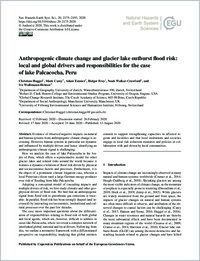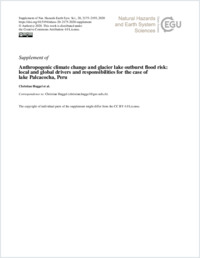Anthropogenic climate change and glacier lake outburst flood risk: local and global drivers and responsibilities for the case of lake Palcacocha, Peru
- Huggel, Christian Department of Geography, University of Zurich, Winterthurerstrasse 190, Zurich, Switzerland
- Carey, Mark Robert D. Clark Honors College and Environmental Studies Program, University of Oregon, Eugene, USA
- Emmer, Adam Global Change Research Institute, The Czech Academy of Science, 603 00 Brno, Czech Republic
- Frey, Holger Department of Geography, University of Zurich, Winterthurerstrasse 190, Zurich, Switzerland
- Walker-Crawford, Noah Department of Social Anthropology, Manchester University, Manchester, UK
- Wallimann-Helmer, Ivo University of Fribourg Environmental Sciences and Humanities Institute, Fribourg, Switzerland
-
13.08.2020
Published in:
- Natural Hazards and Earth System Sciences. - 2020, vol. 20, no. 8, p. 2175–2193
English
Evidence of observed negative impacts on natural and human systems from anthropogenic climate change is increasing. However, human systems in particular are dynamic and influenced by multiple drivers and hence identifying an anthropogenic climate signal is challenging. Here we analyze the case of lake Palcacocha in the Andes of Peru, which offers a representative model for other glacier lakes and related risks around the world because it features a dynamic evolution of flood risk driven by physical and socioeconomic factors and processes. Furthermore, it is the object of a prominent climate litigation case, wherein a local Peruvian citizen sued a large German energy producer over risk of flooding from lake Palcacocha. Adopting a conceptual model of cascading impacts and multiple drivers of risk, we first study climatic and other geophysical drivers of flood risk. We find that an anthropogenic signal from flood risk to greenhouse gas emissions is traceable. In parallel, flood risk has been strongly shaped (and increased) by interacting socioeconomic, institutional and cultural processes over the past few decades. The case raises important questions about the differentiation of responsibilities relating to flood risk of both global and local agents, which are, however, difficult to address in cases like Palcacocha, where we reveal a complex network of interlinked global, national and local drivers. Following from this, we outline a normative framework with a differentiated perspective on responsibility, implying that global emitters commit to support strengthening capacities in affected regions and localities and that local institutions and societies engage in local risk reduction measures and policies in collaboration with and driven by local communities.
- Faculty
- Faculté des sciences et de médecine
- Department
- Département de Géosciences
- Language
-
- English
- Classification
- Meteorology, climatology
- License
- License undefined
- Identifiers
-
- RERO DOC 329426
- DOI 10.5194/nhess-20-2175-2020
- Persistent URL
- https://folia.unifr.ch/unifr/documents/309010
Other files
Statistics
Document views: 115
File downloads:
- wal_acc.pdf: 169
- wal_acc_sm.pdf: 133

